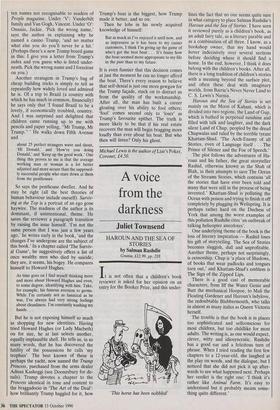A voice from the darkness
Juliet Townsend
HAROUN AND THE SEA OF STORIES by Salman Rushdie
Granta, £12.99, pp. 218
It is not often that a children's book reviewer is asked for her opinion on an entry for the Booker Prize, and this under- 'This horse has been nobbled' lines the fact that no one seems quite sure in what category to place Salman Rushdie's Haroun and the Sea of Stories. I have seen it reviewed purely as a children's book, as an adult fairy tale, as a literary parable and as a combination of all three. I know, as a bookshop owner, that my hand would hover indecisively over several sections before deciding where it should find a home. In the end, however, I think it does belong with the children's books. After all, there is a long tradition of children's stories with a meaning beyond the surface plot, and often these deal with imaginary worlds, from Barrie's Never Never Land to C. S. Lewis's Narnia.
Haroun and the Sea of Stories is set mainly on the Moon of Kahani, which is divided into two regions, the Land of Gup, which is bathed in perpetual sunshine and filled with talk and laughter, and the dark silent Land of Chup, peopled by the dread Chupwalas and ruled by the terrible tyrant Khattam-Shud, 'The Arch-Enemy of all Stories, even of Language itself . . . The Prince of Silence and the Foe of Speech.'
The plot follows the adventures of Ha- roun and his father, the great storyteller Rashid, otherwise known as the Shah of Blah, in their attempts to save The Ocean of the Streams Stories, which contains 'all the stories that have ever been told and many that were still in the process of being invented.' Khattam-Shud is polluting the Ocean with poison and trying to finish it off completely by plugging its Wellspring. It is perhaps rather hard on the Duchess of York that among the worst examples of this pollution Rushdie cites 'an outbreak of talking helicopter anecdotes'.
One underlying theme of the book is the loss of literary inspiration — Rashid loses his gift of storytelling. The Sea of Stories becomes sluggish, dull and unprofitable. Another theme, perhaps not surprisingly, is censorship. Chup is 'a place of Shadows, of books that wear padlocks and tongues torn out,' and Khattam-Shud's emblem is The Sign of the Zipped Lips.
There is a good cast of memorable characters, from Iff the Water Genie and Butt the mechanical Hoopoe, to Mali the Floating Gardener and Haroun's ladylove, the redoubtable Blubbermouth, who talks in almost as many italics as Queen Victoria herself.
The trouble is that the book is in places too sophisticated and selfconscious for most children, but too childlike for most adults. The writing is, as one would expect, clever, witty and idiosyncratic. Rushdie has a good ear and a felicitous turn of phrase. When I tried reading the first few chapters to a 12-year-old, she laughed at the play on words, and the dialogue, but I noticed that she did not pick it up after- wards to see what happened next. Perhaps her verdict is the right one: 'I think it's rather like Animal Farm. It's easy to understand but it probably means some- thing quite different.'


























































 Previous page
Previous page